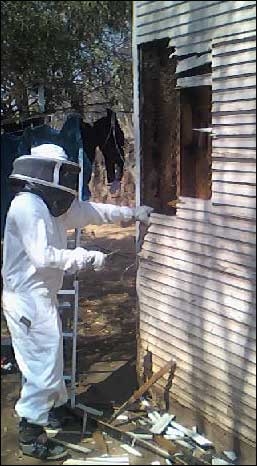 BEE REMOVAL ASSOCIATION OF SOUTH AFRICA
BEE REMOVAL ASSOCIATION OF SOUTH AFRICA

Bee Removers in South Africa
While bees are essential for pollination and food production it occasionally necessary to remove them; mainly due to swarming or hive building in inappropriate places resulting in inconvenience or possible danger to humans and animals.
What are the most common bee removal methods?
 Relocation:
Relocation:
The preferred method of bee removals is relocation, this includes the safe removal of a swarm or hive from a given location, and relocating in a bee friendly position. This should be done with as little disruption or damage to the bees and the structure from which the hive is removed.
Occasionally a bee remover may need to force his way into the structure in order to effectively remove the bees.
Re-hiving of feral swarms:
The removal of feral swarms is to be attempted by trained bee removers only. Because of the potential danger this is best not attempted by any untrained person. Members of BRASA will know their limitations and be able to recommend someone for whom feral swarm removal is a speciality.
Swarm eradication:
The least favoured of the bee removal options as an ethical and humane approach should put the life of the swarm ahead of all other options. However in certain instances the best solution is to eradicate the swarm. This should be done swiftly and purposefully with the appropriate poison in order to prevent any lingering of the bees.
If a client wants the swarm removed through eradication it is the duty of the bee remover to convince the client that removal and re-hiving is the preferred solution.
Ethical and humane bee removals along with a bit of hard work can help bee-keeping evolve into a profitable hobby or business.
How to choose a bee removal company
Finding yourself in the unexpected company of bees can be somewhat disconcerting. And it is only a natural reaction to want them gone, as far and as fast as possible. But don't do anything rash like attempt to remove them yourself. And don't just pick up the phone and call the first extermintaor on the list to help you with your problem.
Rather go back inside, make sure al your pets and children are safely inside, away from where they can come to any harm. Calmly look at the options on your list of pest controllers and bee removers. What do they promise? Can they deliver.
Things to look for when selecting your bee remover:
-
Are they registered to any organisation?
- Find out if they have any form of insurance (It shows that they are aware of the possible danger)
- What happens to the bees once they are emoved? It is preferable to remove the bees alive and relocate them. Both for humane reasons and because of the dwindling bee population world-wide
- When you call to make an appointment confirm whether the bee remover is able to remove the bees from their location. Some bee removal teams choose not to do certain jobs as they may not be properly equipped to complete the job successfully
- Will the bee return after the bee removers have left? The bee removers should make sure to remove any traces of honeycomb and honey.
Below is a list of Bee removers and Beekeepers associations in South Africa including those with an interest in apiculture as a business:
Bee Removal Joburg
www.beeremoval.joburgBee Removal Joburg offers fast and friendly bee removal servies in Johannesburg, know for there bee friendliness accross South Sfrica.
SABIO – South African Bee Industry Organisation
http://sabio.org.za/ SABIO represents all aspects of the bee industry in South Africa from
beekeeping to honey production and fruit pollination.
SABIO aim to act as the mouth piece for the bee industry in South Africa.
South African Apiculture Federation
http://www.saafederation.co.zaThe goals and aims of SAAF is to achieve prosperity for all involved in bee keeping, from researchers to those who bottle honey.
Kwa Zulu Natal Bee Farmers Association
http://kznbeefarmersassociation.infoKZN Bee farmers association aims to advance the science of apiculture, to actively assist new bee farmers to establish and expand their business and to co-ordinate the marketing of honey products through the Royal Agricultural Society's Honey Hall
Eastern Highveld Beekeepers Association
P.O. Box 9359, Cinda Park, 1463
Tel: 011-8961944,
email: baindrain@icon.co.za
Buzz Bee Removals
www.beeremovals.co.zaLocated in Johannesburg
Branches countrywide
tel:011 482 8666
email:sales@beeteam.co.za
Bee Removal in Johannesburg
Bees removed across Johannesburg including Northcliff and Randburg.
Safe quick and effective.
http://beekeepers.injohannesburg.co.za/
Mpumalanga Bee Group
P.O. Box 2726, White River, 1240
Cell 082-6082008
email: fredbence@yahoo.com
Western Cape -Honeybee rescue and removal
Situated at Rivendale Farm, Durbanville, WC
Tel:+27 82 490 8561
The Bee Team
Johannesburg
Servicing the greater Johannesburg area
cel: 072 596 8299